China and US Restart Climate Diplomacy
Air Date: Week of November 24, 2023
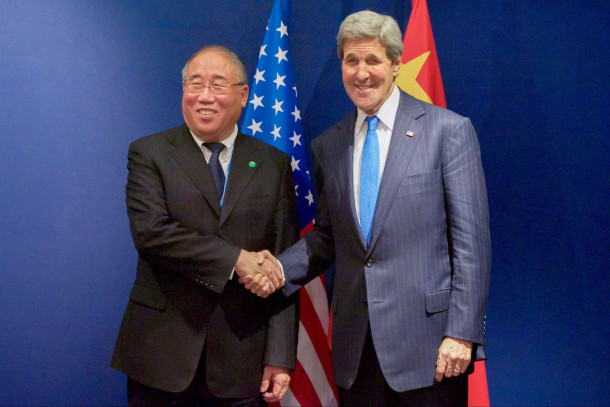
China’s Special Envoy for Climate Change Xie Zhenhua and US Special Envoy on Climate John Kerry released a statement on November 14, 2023 on “enhancing cooperation to address the climate crisis.” They are pictured here in 2015. (Photo: US Department of State, Flickr, Public Domain)
The world is way off track from the Paris Agreement goal to limit warming to 1.5 degrees Celsius. A new joint statement on fighting the climate crisis from the world’s two biggest emitters, China and the United States, offers a glimmer of hope for global action on the eve of COP28. Alden Meyer of the climate think tank E3G joins Host Steve Curwood to explain.
Transcript
CURWOOD: One of the landmark features of the 2015 Paris Agreement was that instead of setting a one-time goal, countries agreed to keep raising the bar on their climate pledges and take stock of progress to see what more should be done to protect the planet. The first-ever formal stocktake is set to conclude at the upcoming COP28 in Dubai and is meant to inform the next round of climate action plans that countries will put forward by 2025 under the Paris Agreement. So far, we are way off track. While science tells us the world must reduce emissions by at least 45% by 2030 to remain under 1.5 degrees Celsius of warming above pre-industrial levels, emissions are still on track to keep rising, putting us on a path to what the UN calls a catastrophic increase of 3 degrees in the years ahead. So, a new joint statement on fighting the climate crisis from the world’s two biggest emitters, China and the United States, offers a glimmer of hope. Alden Meyer is a Senior Associate at the climate think tank E3G. Welcome back to Living on Earth, Alden!
MEYER: Great to be with you, Steve.
CURWOOD: So this is the first time that we've had a positive statement on US and China relations regarding the climate in well, it's more than a year. So talk to me about the positive commitments that are in this latest statement.
MEYER: Well there's a few things to point out. First of all, China agreed that going forward national pledges under the Paris Agreement ought to be economy wide, and include all greenhouse gases. This is significant because up to now, China's commitments have only involved carbon dioxide, which is the principle greenhouse gas. But gases like methane, nitrous oxide, other greenhouse gases were not covered by commitments that China has made in the past. Just to give you a sense of the scale on this, if you took China's methane, nitrous oxide, and other greenhouse gases, as a country it would represent the third largest emitter in the world. In other words, put the CO2 aside, methane, N2O, and other gases are huge from China because of the scale of its economy.
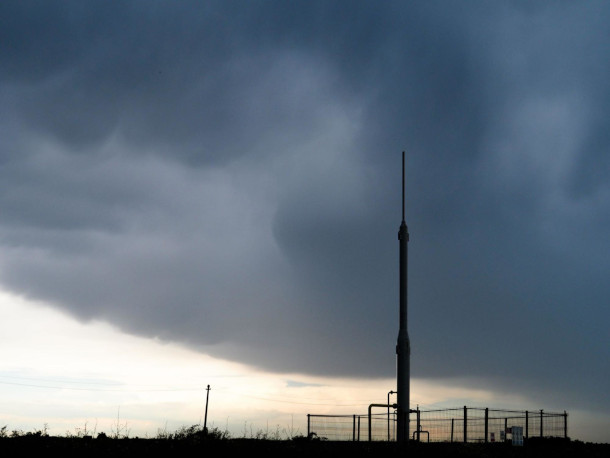
The US and China plan to hold a Methane and Non-CO2 Gases Summit at COP28. Methane, nitrous oxide, hydrofluorocarbons, and other greenhouse gases account for around one third of total emissions. (Photo: Clean Air Task Force, Flickr, CC BY 2.0)
CURWOOD: As I understand it, the communique says that the US is going to host a summit on methane and other non-CO2 gases at COP 28. What's that all about? How important is that?
MEYER: It could be quite important. It's the US working with China and the United Arab Emirates Presidency of the climate summit will host this meeting. It's methane, nitrous oxide, hydrofluorocarbons, other greenhouse gases, and those account for, you know, somewhere around 30, 35% of total emissions. So it's a big share of what we have to address. And of course, two years ago, in Glasgow, at Conference 26, you did have the US and Europe launching the Global Methane Pledge. And under that pledge, now, over 100 countries have agreed to try to reduce their methane emissions by at least 30% by the year 2030. And of course, to try to do better than that. China, India, several other big countries, were not signing up to that agreement. So it's particularly significant that China, which has huge methane emissions, is willing to say, it will put some goals on the table, and it will be part of this discussion in Dubai about how we can collectively reduce methane emissions. And the good news is that there's a lot you can do to control these emissions at a relatively low cost. So again, it's something that we can ramp up fairly quickly, if there's the right kind of measures and political incentives.
CURWOOD: What did you make of the statement about subnational cooperation between the US and China? What can one infer from that?
MEYER: Well, I think that is significant. There has been a history of cooperation at the subnational level between provinces and states and cities. For example, Governor Newsom of California recently went to China and had a series of very high profile meetings with Chinese officials, including President Xi. And California has cooperated with China in designing its emissions trading system, for example. Those exchanges have been scaled back a little bit in recent years. Of course, during the Trump administration, there wasn't as much interest in that from the US side. And more recently, with some of the tensions over Taiwan, China has been not as interested. So it's good to see that emphasized in here. And they did announce that they would be holding a pretty significant event in the first half of next year, involving subnational leaders from both countries, so governors, mayors, business leaders. And I would say that, overall, globally, subnational leaders have been a bright spot in sometimes a fairly dreary negotiating setting. Many of them have a culture of radical collaborations, as opposed to the zero-sum politics that you sometimes see in the national level negotiations.

The US-China statement included intentions to ramp up subnational cooperation on climate change. Some leaders like California Governor Gavin Newsom have already worked with Chinese officials on environmental issues. (Photo: Gage Skidmore, Flickr, CC BY-SA 2.0)
CURWOOD: So let's talk about things that didn't look so positive from this statement. I didn't see anything about China committing to dealing with new coal. I think they're scaling up coal still. And of course, the US, I don't think in this statement, mentioned phasing down oil and gas production. In fact, we're expanding our oil and gas production as we speak. So that's a pretty glaring hole to this agreement. Alden. What does it say to you?
MEYER: Well, let's start with the coal issue first. As you say, China is continuing to build new coal generation capacity. In fact, they have more coal plants in the pipeline and planned than the entire remaining US fleet of coal power plants. So it's a huge amount of new coal capacity they're building. In 2021 in the Glasgow declaration they did make a commitment to try to reduce overall coal related emissions in the second half of the 2020s. There is an updated version of that statement in this declaration, but it does not commit them to cancel all the new coal power plants they're building. On the US side, you're correct, the US is continuing to expand oil and gas production and is ramping up extensively exports of liquefied natural gas, LNG. And that is really not consistent with the commitment to try to stay below 1.5 Celsius temperature increase. So both countries are not providing the kind of signals they should be on the need to ratchet down production and consumption of fossil fuels in the near term. And that is a glaring omission from this joint declaration.
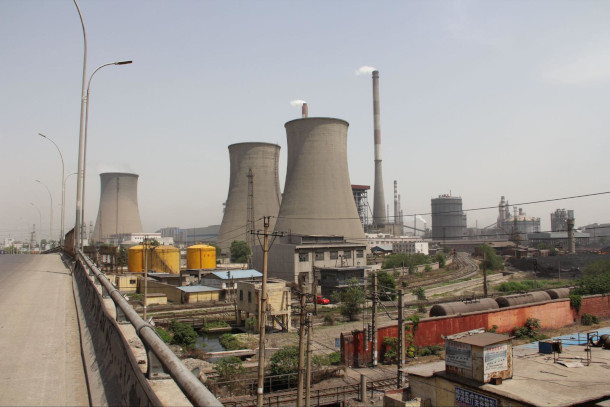
China is still building a staggering number of new coal-fired power plants, despite its stated efforts to fight the climate crisis. (Photo: V.T. Polywoda, Flickr, CC BY-NC-ND 2.0)
CURWOOD: To what extent do you think that reflects local politics, domestic politics?
MEYER: I think it reflects domestic politics in both countries. I mean, in China, they are quite concerned looking at the power outages that some other developing countries have been experiencing. So it's an energy security issue for them. I'm told there's also 700,000 people employed in the coal sector in China. So it's a major economic issue for them at a time when unemployment rates are increasing. But a lot of observers have said that China does not need to increase its coal to address these issues, that it can continue to expand its renewable energy production, where it's the world leader, can continue to increase the efficiency of electricity use. In the US, of course, energy production and exports are a major political issue. A lot in the Republican Party had been attacking President Biden over his presumed opposition to energy independence, which is really a myth. He's actually been expanding production of fossil fuels in the US. And I imagine the administration was very concerned about anything that the Republicans could use in next year's election that would say the President had committed to reduce oil production, for example, at a time when gasoline prices have been increasing. There's also very powerful industry interests in both countries that don't want to see a big deviation from the status quo, don't want the kind of rapid reduction in fossil fuel production and use that the science calls for.
CURWOOD: These days in the US, China is a bit of a whipping boy on Capitol Hill. There's a lot of opposition to the nation of China, skepticism about working with China. What kind of partnership under these conditions can the US and China have when it comes to dealing with the climate emergency?
MEYER: Well, it is a very fraught relationship. And no one is pretending that this agreement on climate change is going to resolve the deep splits on Taiwan and the South China Sea or forced labor in the Uighur region or intellectual property and trade. That being said, climate clean energy is an area where there has been collaboration over the years and including in the lead up to Paris, and that helped broker the agreement. So it's important that the two sides are able to work together. It doesn't mean that we're seeing everything that we need to from either country. But overall, that's definitely helpful when the two biggest economies in the world, the two biggest emitters, can cooperate on some of these issues. It makes it much easier to reach consensus among the 190 plus countries that will be showing up in Dubai.
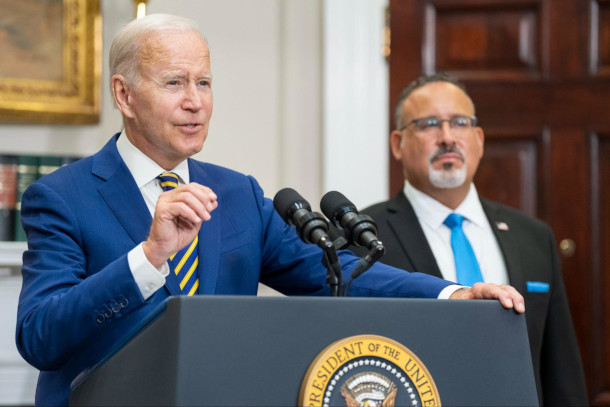
President Biden has expanded fossil fuel production in the US while setting a goal to reach net zero emissions by 2050. (Photo: Prachatai, Flickr, CC BY-NC-ND 2.0)
CURWOOD: So COP 28's just around the corner, Alden. To what extent do you think that these agreements between the US and China will enhance efforts to get consensus at the UAE COP?
MEYER: Well I think they can be helpful on some fronts. I think calling for a robust political outcome on the global stocktake process is good. The science says that we need to get cuts of more than 40% in greenhouse gases by the year 2030. And currently, we are still on track to see a small increase in emissions over the next six years. So there's a huge gap in where we need to be in 2030 and the trajectory that we're on now. Saying that all major countries should aim to have economy wide emission reduction commitments covering all greenhouse gases in their next round of pledges under Paris, which are due by 2025, is good. Supporting the tripling of renewable energy capacity deployment by 2030 is good. Although there the real question is going to be what's the implementation package, that's going to cost hundreds of billions of dollars, for example. Where's that money going to come from? Or take the issue of critical minerals, which has been a fraught space, where China is in a dominant position in producing and refining some of the materials that go into clean energy technologies. That's an issue that is going to take some further work to deconflict. So there's more work to be done. But I think this does provide the basis for cooperation on some issues. And presumably, Secretary Kerry, Minister Zhenhua, will continue to work together during the time in Dubai to help broker agreements on some of these issues by the end of the two weeks.
CURWOOD: Alden, I think I initially met you back at COP 3 in Kyoto, that's 1997. And I think you've been at this longer than that. This COP that's coming up, how do you feel about it, especially in light of what has been announced between the US and China?
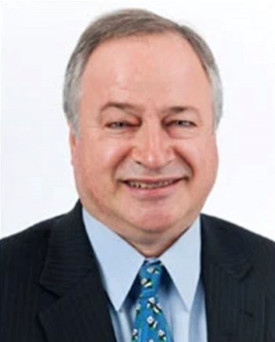
Alden Meyer is a Senior Associate at E3G working on US and international climate policy and politics. He is a Principal at Performance Partners, which provides a range of consulting services to clients in government, business, and the non-profit sector. (Photo: Courtesy of Alden Meyer)
MEYER: It's going to be a significant COP, perhaps the most significant since Paris, since we are taking stock of where we are and how much more we have to do. I think the real question at the end of the day is what comes out of this summit in terms of the path forward on accelerating the energy transition to address the deep ambition gap. Also, what comes out in terms of dramatically scaling up financing for both emission reductions and for coping with climate impacts. So this is going to be an important COP. But I don't think it's going to solve everything, and especially given the fact that it's being hosted by a country that's announced it wants to increase its oil and gas production over the next five to ten years, I think we're likely not the see the kind of bold initiatives that we need on near term reduction of fossil fuel production and use. But I think we have the chance of coming out of here with some progress. As you know, Steve, over the years I've recycled the line, "It was a good step, but much more as needed." I imagine I'll be using that line again at the end of Dubai. Some have called me a serial masochist for going to all these meetings and expecting a different result, but you have to keep fighting. You have to keep hope. You have to keep pressing for change as best you can. So I will be doing that yet once again.
CURWOOD: Alden Meyer is a Senior Associate of E3G. We'll talk to you again soon.
MEYER: Thanks, Steve. Great to talk to you.
Links
Sunnylands Statement on Enhancing Cooperation to Address the Climate Crisis
Inside Climate News | “Can US, China Climate Talks Spur Progress at COP28?”
Living on Earth wants to hear from you!
Living on Earth
62 Calef Highway, Suite 212
Lee, NH 03861
Telephone: 617-287-4121
E-mail: comments@loe.org
Newsletter [Click here]
Donate to Living on Earth!
Living on Earth is an independent media program and relies entirely on contributions from listeners and institutions supporting public service. Please donate now to preserve an independent environmental voice.
NewsletterLiving on Earth offers a weekly delivery of the show's rundown to your mailbox. Sign up for our newsletter today!
 Sailors For The Sea: Be the change you want to sea.
Sailors For The Sea: Be the change you want to sea.
 The Grantham Foundation for the Protection of the Environment: Committed to protecting and improving the health of the global environment.
The Grantham Foundation for the Protection of the Environment: Committed to protecting and improving the health of the global environment.
 Contribute to Living on Earth and receive, as our gift to you, an archival print of one of Mark Seth Lender's extraordinary wildlife photographs. Follow the link to see Mark's current collection of photographs.
Contribute to Living on Earth and receive, as our gift to you, an archival print of one of Mark Seth Lender's extraordinary wildlife photographs. Follow the link to see Mark's current collection of photographs.
 Buy a signed copy of Mark Seth Lender's book Smeagull the Seagull & support Living on Earth
Buy a signed copy of Mark Seth Lender's book Smeagull the Seagull & support Living on Earth

